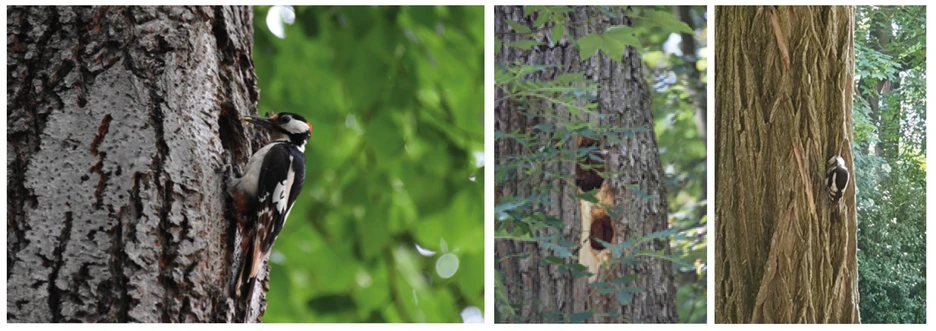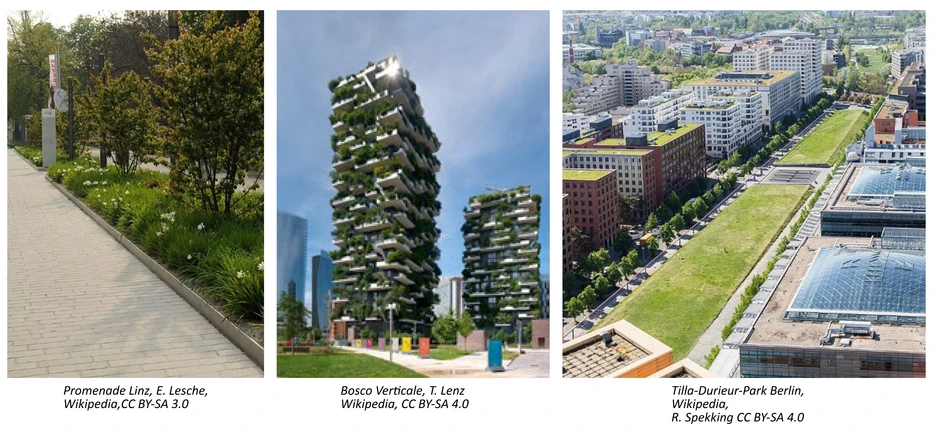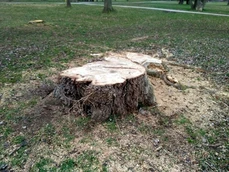Topics for bachelor and master theses
Below is a list of topics for B.Sc. or M.Sc. theses. If you are interested in doing your research in our group the procedure is as follows:
- go through the list and topics and find what you are interested in
- contact the direct supervisor by email and ask for more information
- make an appointment with your direct supervisor to discuss the topic, timeframe etc. in more detail
- if you have found a topic that you would like to choose there will be a meeting between your direct supervisor, yourself and W. Weisser, to discuss the design of your study, starting dates, financial aspects and other formalities.
- you develop a thesis plan that will be part of the formal agreement between yourself, your direct supervisor, and W. Weisser for the thesis
- If you are interested in a topic that is not listed below or if you have any other question please feel free to contact W. Weisser or any other person in the group.
Great spotted woodpeckers are native to forests, but can also live in cities. They remain in the city during winter, but spend the night in protected cavities in trees that they have made themselves. Previous studies have shown that great spotted woodpeckers can be found in many urban areas in Munich, provided there are enough trees. However, great spotted woodpeckers only build their cavities in trees with a breast height diameter of more than 20 cm, and such trees are rare, especially in urban areas where great spotted woodpeckers are only occasionally sighted. Their presence in such areas probably depends on the presence of larger trees in the vicinity.
The aim of the BSc/MSc thesis is to explain the occurrence of great spotted woodpeckers in public places in Munich based on the distribution of suitable trees and tree cavities. Data from previous studies can be used for this purpose. The thesis involves observing great spotted woodpeckers, mapping and measuring trees in the city, and evaluating the data obtained.
The Master's thesis will be supervised in German and English.
Time frame: Winter 2025-2026 (when the trees have no leaves)
If you are interested, please contact Wolfgang Weisser (wolfgang.weisser[at]tum.de).

Landscape architects design open spaces through concrete designs. In doing so, they must take into account the diverse needs of people. Many of these needs are directly or indirectly related to urban nature, which is designed by landscape architects. For example, ecosystem services such as the regulation of the microclimate of an open space through shading depend on the choice of plants, their arrangement and quantity. Experiences of nature in open spaces, such as encounters with animals, are also significantly influenced by the design. However, designing open spaces is not easy due to many constraints. At the same time, ecological promises are often made that may not be possible to keep.
The aim of this thesis is to examine the ecological functionality of landscape architectural designs. Criteria for an ecological functioning of a design are to be developed, taking into account a various functions. Using current examples of designed open spaces, the thesis will examine which functions have been implemented and how. Based on the analysis of these examples, proposals will then be developed on how landscape architecture designs can achieve a high level of ecological functionality.
If you are interested, please contact Wolfgang Weisser (wolfgang.weisser[at]tum.de).


Assessing the impact of tree felling on the loss of green infrastructure in urban areas
Urban trees are important for a range of ecosystem services in the city, and the importance of a tree increases with age due to its larger crown. However, the exact relationship between the size of a tree and the ecosystem services it provides is not known. Experiments with newly planted trees are difficult because trees take a very long time to grow. Tree felling offers an alternative: by measuring ecosystem services before and after tree felling, the (former) contribution of the tree can be estimated.
In this master's thesis, tree felling in Munich and Ingolstadt will be used to make an initial estimate of the contribution of trees of different sizes to ecosystem services.
The contribution of felled trees to green infrastructure will be determined by evaluating aerial photographs and maps. To this end, the difference in the Normalised Difference Vegetation Index (NDVI) before and after felling will be determined using comparison areas. The difference in NDVI will be correlated with tree size using data provided by the city or from remote sensing data.
The Master's thesis will be carried out in cooperation with DLR Oberpfaffenhofen.
Prerequisite: good to very good knowledge of GIS (ArcGis, QGis or R) or a willingness to learn the methodology in depth with a good foundation.
Start of work: anytime from November 2025.
If you are interested, please contact Prof. Stephan Pauleit (pauleit[at]tum.de) or Wolfgang Weisser (wolfgang.weisser[at]tum.de).
Scientific Background & Project Context
Oak forests support exceptionally high arthropod diversity, yet our understanding of how forest density affects these communities remains limited. This thesis is embedded within the "Nelder Oak Forest" project, a unique long-term experiment funded by the AUDI Environmental Foundation. Since 2008, this research network maintains standardized oak density experiments using innovative Nelder wheel plots that simulate densities from 100,000 to 50 trees per hectare.
Tree density fundamentally alters competitive interactions, resource availability, and plant stress responses. These changes cascade through the ecosystem, potentially affecting arthropod community structure and herbivory patterns. The project provides an unprecedented platform to study these tree-arthropod interactions with 15+ years of baseline data on tree growth and environmental conditions.
Research Focus & Methodology
The specific research question and methodology will be developed collaboratively based on your interests and expertise. Potential approaches include:
- Community ecology: Arthropod diversity surveys using observations and standardized trapping methods
- Functional ecology: Quantifying herbivory rates and leaf damage patterns across density gradients
- Specialized interactions: Investigating gall-inducing insects, leaf miners, or other oak-specialist groups
- Laboratory analysis: Processing leaf samples and arthropod specimens using modern identification techniques
We welcome both broad community approaches and focused studies on particular arthropod groups. Multiple complementary thesis projects are possible, allowing students to collaborate while developing distinct research contributions.
What We Offer
Research Excellence: Intensive supervision by experts in forest ecology, arthropod biodiversity, and tree ecophysiology. Access to comprehensive long-term datasets and state-of-the-art laboratory facilities for arthropod identification and leaf analysis.
Professional Development: Opportunity to contribute to scientific publications, present at conferences, and network with international research partners. Potential field work opportunities at research sites across Europe, depending on project scope and logistics.
Collaborative Environment: Integration into an active research team with ongoing projects linking tree physiology to community ecology across environmental gradients.
Requirements & Expectations
Essential: Strong motivation for biodiversity research, solid foundation in ecological statistics, and willingness to develop R programming skills. Ability to work independently while collaborating effectively within a research team.
Desirable: Experience with arthropod identification, forest ecology field methods, or plant-insect interactions. Prior statistical analysis experience beneficial but not required.
Practical Information
Flexibility: Available immediately with adaptable timing for summer fieldwork, winter laboratory analysis, or spring campaigns. Multiple thesis topics possible within this research framework.
Supervision: Dr. Sebastian T. Meyer (lead supervisor) with Prof. Wolfgang Weisser, in collaboration with tree ecophysiology experts Dominik Ambs and Prof. Richard Peters. Supervision available in English or German.
Contact: Please reach out to Dr. Sebastian T. Meyer with motivation letter, CV, and transcripts to discuss specific research directions and timing.
Research contributing to sustainable forest management supporting both productivity and biodiversity conservation.

Urban areas are expanding rapidly, yet we still have limited knowledge about how city structures influence insect populations. Insects play vital roles in ecosystems, contributing to processes such as pollination, pest control, and soil health. Cities represent unique habitats characterized by fragmented green spaces, varying temperatures, and artificial surfaces, which can either benefit or harm different species.
By investigating how urban structures affect insect diversity and abundance, we can develop strategies to support biodiversity in urban environments. This research is not only scientifically significant but also has practical applications in conservation, urban planning, and sustainable city development. If you are interested in this, this thesis topic presents an opportunity to make a meaningful impact!
We are offering one to two master‘s theses for motivated students to explore how city structures affect arthropod populations in Munich. We will sample ants using pitfall and bait traps and use a variety of sampling methods for other arthropod groups (Insect cameras, trap nests, light traps).
Sampling will occur in various locations throughout Munich, including the city center and surrounding districts.
The master theses include the following work steps:
Literature review on your thesis topic
Fieldwork in Munich in summer
Statistical data analysis in R
Digitization of collected data
Writing
Requirements
Most important is that you are motivated and interested in the topic. You will be supervised by Zoé Hentschel, a PhD student at TUM and Prof. Wolfgang Weisser. We provide a vivid working environment with many Master’s and PhD students with whom you can interact and learn from/together with. We expect that you have some experience with data analysis in R. Prior experience with arthropod sampling is beneficial. The project results might contribute to a publication based on the outcome and the derived data. The theses start in May, at the latest in June 2025. The theses can be supervised in German or English.
If you are interested, please contact: Zoé Hentschel (zoe.hentschel[at]tum.de)
Effects of habitat elements and substrate depth on plant and insect diversity on extensive green roofs
Green roofs offer the opportunity to promote biodiversity, in addition to other functions such as improving the appearance of a building or reducing the heat island effect and surface water run-off. Green roofs can, at least in theory, serve as a refuge for insects and a potential food source for birds and bats. However, green roofs are exposed to extreme climatic conditions, the effects of which are exacerbated by their shallow substrate depth. How exactly the ecological function of green roofs can be enhanced is still relatively unknown, especially for animals.
As part of the ‘Animal-Aided Design’ project, the roof of a building in Brantstraße in Munich-Laim was greened and developed as a test area. An experimental approach will be used to test whether small changes in soil depth (mounds) or the addition of piles of stones, dead wood or refugia can increase the diversity of animals or plants.
The Master's theses focus on either plants or animals. The following work steps are planned:
- Sampling of plants or animals, in particular above-ground insects and soil animals
- Identification of the plants or animals (in some cases sorting by order)
- Statistical analysis of the data to test which of the approaches have positive effects on plants or animals.
If the work is successful, the results can be published together with other data. The Master's thesis will be supervised in German and English.
If you are interested, please contact Wolfgang Weisser (wolfgang.weisser[at]tum.de).